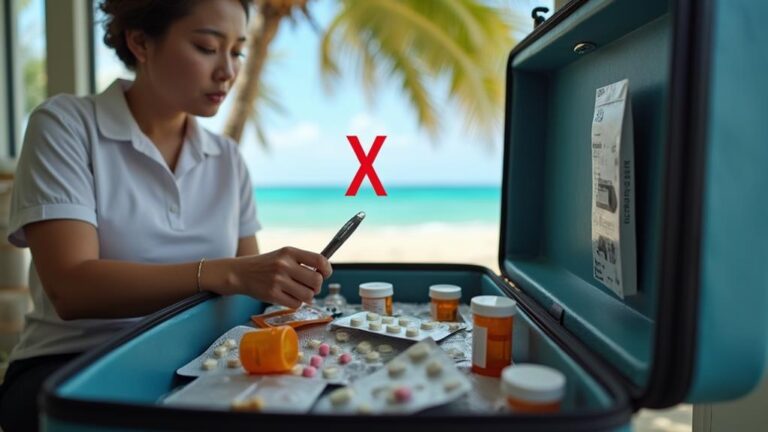To stop diarrhea in Thailand, follow these seven essential tips: Choose safe food and drinks, avoiding raw or undercooked items. Practice proper hygiene by washing hands frequently and using hand sanitizer. Stay hydrated with oral rehydration solution (ORS) to restore electrolyte balance. Recognize warning signs like high fever or bloody stools and seek medical attention promptly. Use medications wisely, consulting a doctor before taking antibiotics. Adapt your diet temporarily, opting for easily digestible foods. Seek medical care when necessary, especially for severe symptoms or persistent illness. These strategies can help you effectively manage and prevent diarrhea during your stay in Thailand. Further exploration of these tips can enhance your preventive measures.
Table of Contents
Key Takeaways
- Consume only bottled water and hot, freshly cooked meals from reputable restaurants to avoid contaminated food and drinks.
- Practice proper hygiene by washing hands frequently and using hand sanitizer with at least 60% alcohol.
- Stay hydrated with oral rehydration solution (ORS) to restore electrolyte balance and prevent severe dehydration.
- Choose easily digestible foods like rice and bananas, and incorporate probiotic-rich foods for gut health.
- Seek medical attention for severe symptoms like high fever, bloody stools, or persistent diarrhea lasting more than a few days.
Choose Safe Food and Drinks
Food safety practices are vital when traveling in Thailand to prevent diarrhea. To minimize the risk of foodborne illnesses, avoid consuming raw or undercooked foods. Instead, opt for hot, freshly cooked meals from reputable restaurants. This approach greatly reduces the chances of ingesting harmful pathogens that can cause diarrhea.
Drinking water safety is essential in preventing waterborne diseases. Always choose bottled water or beverages made from boiled water. Be cautious of ice from questionable sources, as it may be made from contaminated water. When in doubt, request drinks without ice to further decrease your risk.
Maintaining proper hygiene is paramount in preventing diarrhea. Wash your hands frequently with soap and water, especially before eating. When soap and water are unavailable, use hand sanitizer as an alternative. This practice helps eliminate potential pathogens that could lead to gastrointestinal issues.
Practice Proper Hygiene
Maintaining proper hygiene is fundamental in preventing diarrhea while traveling in Thailand. To diminish the risk of infection, wash your hands frequently with soap and water for at least 20 seconds. This practice is particularly vital before eating, after using the restroom, and after touching potentially contaminated surfaces.
When soap and water aren't accessible, use a hand sanitizer containing at least 60% alcohol.
Avoid touching your face, especially your mouth, nose, and eyes, as these are entry points for pathogens that can cause diarrhea. Practice good respiratory hygiene by covering your mouth and nose with a tissue or your elbow when coughing or sneezing. This prevents the spread of bacteria and viruses that may lead to gastrointestinal infections.
In your accommodation, regularly clean and disinfect frequently touched surfaces such as doorknobs, faucets, and countertops. This diminishes the risk of contamination and helps prevent the spread of diarrhea-causing pathogens.
Stay Hydrated With ORS
Prioritize oral rehydration when experiencing diarrhea in Thailand. Oral Rehydration Solution (ORS) is a vital tool for maintaining hydration and replacing lost electrolytes during diarrheal episodes. This scientifically formulated solution contains a precise balance of salts and sugars, designed to optimize fluid absorption in the intestines.
To effectively use ORS, consume it in small, frequent sips throughout the day. This method aids in gradual rehydration and prevents further fluid loss.
The carefully calibrated composition of ORS helps restore the body's electrolyte balance, which is crucial for proper cellular function and overall health.
In resource-limited settings like rural Thailand, ORS serves as a cost-effective and readily available treatment for diarrhea. By consistently using ORS, you can notably reduce the severity and duration of diarrheal episodes.
This proactive approach to hydration management can prevent the progression to severe dehydration, which may require more intensive medical intervention.
Always keep ORS packets on hand when traveling in Thailand. Prepare the solution using clean, safe water, and consume it within 24 hours to ensure optimal efficacy.
Proper hydration with ORS is a fundamental step in managing diarrhea and promoting recovery.
Recognize Warning Signs
While ORS is an effective first-line treatment for diarrhea, it's important to recognize when additional medical intervention is necessary. In Thailand, certain warning signs indicate the need to seek medical attention promptly. If you experience high fever, severe abdominal pain, or bloody stools, don't hesitate to consult a healthcare provider. These symptoms may indicate a more serious underlying condition that requires immediate medical care.
Additionally, if your diarrhea symptoms persist or worsen after 1-2 days of self-treatment, it's advisable to visit a clinic or hospital. Severe cases of diarrhea in Thailand may require hospitalization for intensive treatment and monitoring. When seeking medical care, be prepared for the possibility of providing a stool sample, as this helps diagnose the specific cause of your diarrhea.
For travelers in Bangkok, the Travel Clinic offers walk-in services without appointments, providing convenient access to medical care. By recognizing these warning signs and acting promptly, you can ensure timely treatment and prevent potential complications associated with prolonged or severe diarrhea in Thailand. Remember, early intervention is key to managing diarrhea effectively and minimizing its impact on your health and travel plans.
Use Medications Wisely

When managing diarrhea in Thailand, you'll need to use medications wisely. Over-the-counter remedies like loperamide can help control symptoms, but avoid them if you have a fever or bloody stools.
For bacterial diarrhea, you may require antibiotics such as Ciprofloxacin, but always consult a medical professional before starting any treatment.
Over-The-Counter Diarrhea Remedies
Over-the-counter diarrhea remedies can provide relief for travelers experiencing gastrointestinal distress in Thailand. Loperamide, a common active ingredient in these medications, works by slowing down bowel movements and reducing the frequency of loose stools. This can help control symptoms of traveler's diarrhea effectively.
When using over-the-counter medications, it's essential to follow the recommended dosage and usage instructions carefully. Don't exceed the prescribed amount, as this may lead to adverse effects. Be aware that anti-diarrheal medications are contraindicated in cases of high fever or bloody stools. In such situations, seek immediate medical attention.
Before using any over-the-counter remedies for diarrhea, consult a healthcare provider. They can provide personalized advice based on your medical history and current condition. Here's a summary of key points to remember:
| Medication | Use | Precautions |
|---|---|---|
| Loperamide | Control diarrhea symptoms | Don't exceed recommended dosage |
| Anti-diarrheals | Reduce loose stools | Avoid if high fever or bloody stools present |
| OTC remedies | Relieve gastrointestinal distress | Consult healthcare provider before use |
| Traveler's diarrhea treatments | Manage symptoms while traveling | Follow usage instructions carefully |
| All diarrhea medications | Provide temporary relief | Discontinue if symptoms worsen |
Appropriate Antibiotic Usage
Antibiotics play a significant role in treating severe cases of traveler's diarrhea in Thailand, but they must be used carefully. Appropriate antibiotic usage is vital to reduce the risk of antibiotic resistance and guarantee effective treatment. When experiencing diarrhea in Thailand, it's important to consult a healthcare provider before resorting to antibiotics.
Your healthcare provider will assess the severity of your symptoms and determine if antibiotic treatment is necessary. Antibiotics are typically reserved for severe cases of traveler's diarrhea or when there's a risk of complications. If prescribed, it's essential to follow the prescribed course exactly as directed to maximize effectiveness and minimize the potential for antibiotic resistance.
Remember that not all cases of traveler's diarrhea require antibiotics. Mild to moderate cases often resolve on their own or with over-the-counter remedies. However, if symptoms persist and become severe, or if you're at risk for complications, antibiotics may be warranted. By using antibiotics appropriately and only when necessary, you contribute to the global effort to combat antibiotic resistance while effectively treating your condition in Thailand.
Anti-Motility Drug Precautions
In light of managing traveler's diarrhea symptoms, anti-motility drugs like loperamide can be effective. These medications work by slowing down gut movement, which can provide relief from frequent bowel movements. However, it's important to use these drugs cautiously and follow specific precautions when dealing with traveler's diarrhea in Thailand.
You should avoid using anti-motility drugs if you're experiencing fever or bloody stools, as these symptoms may indicate a more severe underlying infection. Additionally, these medications aren't recommended for certain types of diarrhea caused by specific bacteria, such as Shigella or invasive strains of E. coli. Using anti-motility drugs in these cases could potentially conceal serious infections and delay proper treatment.
Always consult with a healthcare provider before using loperamide or other anti-motility drugs for traveler's diarrhea in Thailand. They can provide guidance on appropriate usage and help determine if these medications are suitable for your specific situation. Follow their instructions carefully to manage your symptoms effectively. If your condition worsens or persists despite using anti-motility drugs, seek immediate medical attention. This precautionary approach will help guarantee your safety and proper treatment while dealing with traveler's diarrhea in Thailand.
Adapt Your Diet Temporarily
When experiencing diarrhea in Thailand, adapting your diet temporarily is essential for managing symptoms and promoting recovery. Choose easily digestible foods to calm your stomach and avoid exacerbating the condition. Opt for bland options like rice, bananas, and toast, which are gentle on your digestive system.
Stay hydrated by consuming clear fluids such as water, herbal teas, and electrolyte-rich drinks. These will help replenish lost fluids and minerals. As your symptoms improve, gradually introduce bland foods like boiled potatoes or plain chicken.
To support your recovery and restore healthy gut bacteria, consider incorporating probiotic-rich foods such as yogurt into your diet. However, be cautious with dairy products, as they can aggravate diarrhea in some individuals.
When adapting your diet in Thailand during a bout of diarrhea:
- Avoid spicy street food and local delicacies temporarily
- Stick to bottled water and avoid ice in beverages
- Choose steamed or boiled dishes over fried options
- Opt for fruits with edible peels, like bananas
- Request meals without added sauces or condiments
Seek Medical Care When Necessary

Recognizing when to seek medical care is vital when dealing with diarrhea in Thailand. You should consult a healthcare provider if you experience large volume diarrhea, defined as four to five episodes per day. This frequency can lead to dehydration, a potentially risky condition that requires proper medical treatment.
Pay attention to other accompanying symptoms that may indicate a need for medical intervention. A high fever exceeding 39°C or extreme fatigue are clear signs that you should seek medical care promptly. Additionally, if you develop severe abdominal pain or rectal pain, especially when combined with mucous or bloody stools, it's important to consult a doctor immediately.
Travelers diarrhea can sometimes persist and become severe, affecting your overall health and travel experience. In such cases, professional medical care can provide effective management of your condition. Healthcare providers can assess your symptoms, conduct necessary tests, and prescribe appropriate treatments to alleviate your discomfort and prevent complications. Remember, seeking timely medical attention can greatly reduce the duration and severity of your symptoms, allowing you to recover more quickly and safely.











